The first thing I learn about Misty Snow when I meet her at a beauty salon in downtown Salt Lake City is she’s not a coffee person. The first-time Democratic candidate for Senate prefers Mountain Dew Voltage, which according to the label, is charged with raspberry, citrus flavor and ginseng. She’s taking sips from a can here and there as her hair and makeup is perfected by a volunteer. Snow apparently is not a fan of this part of the morning, but she realizes that it’s part of the new life she’s chosen as a public figure and possible senator. If elected in November, Snow would be the first transgender senator and first millennial senator on Capitol Hill, but she tends to downplay the historic nature of her campaign as others celebrate its significance.
“You would think that would happen in California or New York, but Utah of all places,” Amanda Berg, a student at the University of Utah, told me recently about Snow. “We are so much more progressive than they think we are.”
Just a few months earlier, prior to her June win in the Utah Democratic primary against a massage therapist named Jonathan Swinton, Snow, 31, was working full-time as a cashier at a Harmons Grocery store, a job she’s had since the age of 17. Snow tells me she had no real interest in seeking the political limelight or a new life representing 3 million Utahans.
“The other guy pissed me off so much,” Snow says about Swinton, as a friendly woman named Skyler puts the final touches on Snow’s curls. “I want Democrats to nominate people who will stand up to the Republicans, not agree with the Republicans.”
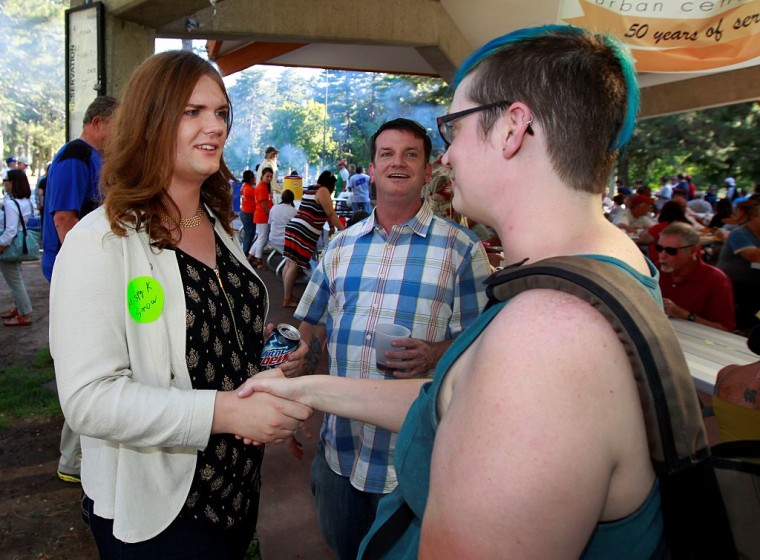
Despite having tuition-free higher education as central to her platform, Snow didn’t attend college. Yet she spent the bulk of her 20s obsessively following current events and being energized by progressive politicians like Ralph Nader and former two-term Salt Lake City Mayor Rocky Anderson, who famously called for the impeachment of former President George W Bush. And as Snow watched Swinton rail against Planned Parenthood and as Bernie Sanders enthusiasm swept Utah, Snow decided to pony up the entirety of her income tax return and submit the $1,355 needed to become a federal candidate in the state. And now here she is, in awe of most of the attention she’s gotten, but remaining firm on why she jumped into the race in the first place.
“I’m not sure there’s a normal day, because every day is different,” she tells me. “There’s always a million things going on. It can be exhausting some days, but we just gotta do it. I kind of miss my quiet life, but I do think it’s important to stand up for issues I care about.”
It’s a Tuesday, and Snow has little time left to make her case to Utahans on why they should vote for her. And at this stage every vote counts for Snow, especially in a state with low voter turnout. Despite endorsements from Our Revolution, an organization run by Bernie Sanders, and Howard Dean’s Democracy for America, the most recent polling by Utah Policy, a site covering the state’s political landscape, has Senator Mike Lee -- the popular Mormon Republican incumbent and pointed Trump critic –- leading by 37 points. Snow realizes her long odds as a progressive Democrat in Utah taking on a high-level Republican, but she remains undaunted, at least in conversations with me and in public.
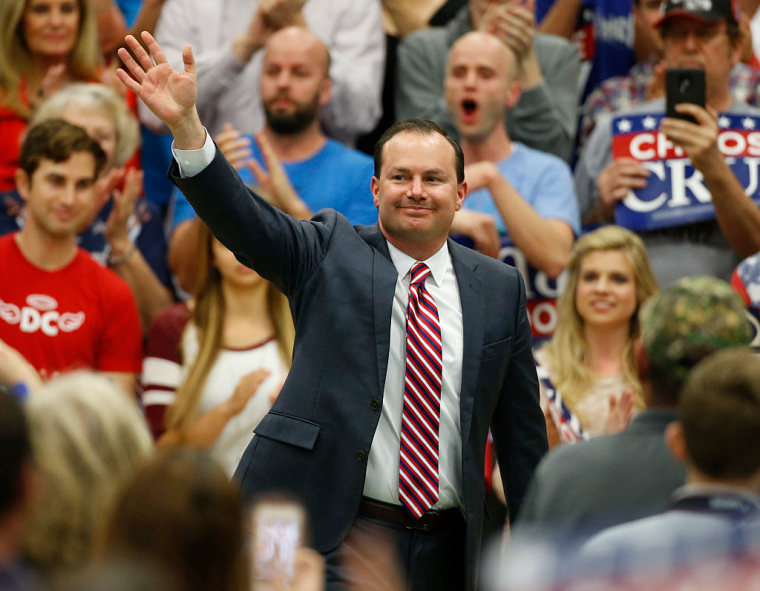
When I ask her about those numbers, she works to put things in something of a historical context.
“It’s been more encouraging I think than a lot of people realize. In 1992, the Democratic candidate for U.S. Senate in Utah [Wayne Owens] got 39.7 percent of the vote. Since then the best showing for a Democrat for Senate has been 33 percent of the vote. If I could get more than that, it would be the best showing for a Democrat since 1992. I think I can; I think I’ll beat 33 percent. I think I’ll show them that you can run as a progressive, and you can actually do well.”
One thing I learn quickly about Snow is she’s formidable with statistics and numbers –- clearly a valuable skill on the stump and in office -- prompting me to ask her if she has something of a photographic memory. She responds saying that is a question she’s received her entire life.
Troy Williams, the Executive Director of Equality Utah, tells me that Snow’s campaign is exciting for state politics. “All Democrats in the state of Utah have an uphill battle on statewide races and in federal races,” he tells me. “But that is how the LGBT community is in the state of Utah. We know that the odds are stacked against us, but we’re to keep fighting anyway.”
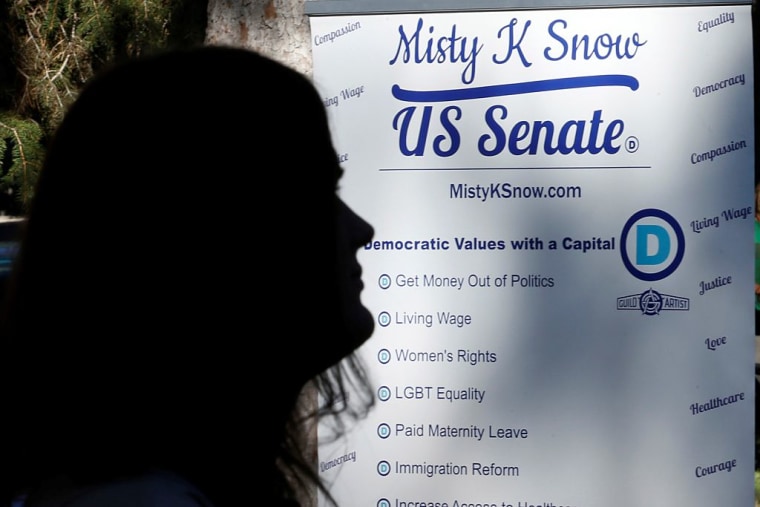
Today, Snow is kicking off the day at Brigham Young University (BYU) -- roughly an hour south down I-15 from the deeply conservative Provo –- meeting college voters at what’s being billed a political involvement fair. Later, she has the Democratic Women’s Annual Spaghetti Dinner and Candidate Fair just a bit north of BYU on the Utah Valley University campus in Orem. When we arrive at BYU, campus workers are still setting up tables for the event.
“It would be nearly impossible for a Democrat to win,” Richard Davis, a BYU political science professor and onetime candidate for Utah state Democratic Party chair, tells me during the fair. “It is a very Republican state. In Utah, [Trump] is likely to win, but he’s likely to win with just a plurality of the vote. And that means that’s an opening for Democrats, but it’s unlikely Misty Snow will fill that gap. She is first a Democrat in a Republican state, and the fact that she’s also very liberal makes it unlikely that voters are going to turn to her. I think Mike Lee will win by a large margin.”
Snow grew up Mormon before leaving the church in her early teens after objecting to what church elders preached about Ellen Degeneres, who famously came out as lesbian in the late 90s. Snow also cites her growing awareness of being transgender as another factor in choosing to leave the church.
“I always had these feelings, and they all started coming to a head when I went through puberty,” she says. After years of struggling, Snow finally began living openly as a transgender woman in late 2014, and while she admits to this causing temporary strain at home, her mother is now supportive of her and her campaign.
“People tell me they like what I'm doing,” Snow offers in a rare moment of semi-boasting. “Another woman in Texas who is trans says she's running for House of Representatives in 2018 because she really likes what I'm doing here. A lot of people tell me their own stories and how much it means to them and how inspiring I am."
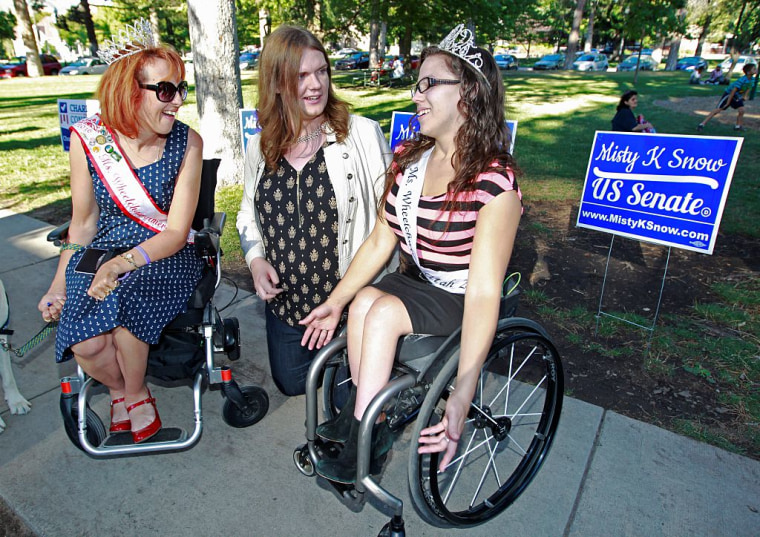
Back at the candidate fair at BYU, it’s apparent that Snow approaches these events with determination, seemingly jumping into them with a fierce focus and boundless energy. Snow seems to have a heads-down style toward campaigning; she's not much for small talk or asking a lot of questions, but it’s apparent she’s absorbing everything around her and likely remembering all the small details. When she does engage, whether it’s an interviewer or a potential voter, her speech is often rapid-fire and sometimes jumbled and difficult to pick up, her sharp mind is clearly working at top-speed to get out the myriad big ideas she has in what she seems to view as little time.
At BYU, Snow is the first candidate to arrive, and one of the only actual candidates running for office in Utah attending the fair. Incumbents Mike Lee and Jason Chaffetz are both in Washington for the work week, and Snow makes it a point to tell any potential voter she’s never been to Washington. Not on vacation; not for work.
As one of her volunteers helps her set up a campaign booth in the Wilkinson Student Center Garden Court, Snow paces back and forth around the tables, noting she’s by the glass doors facing the Jamba Juice, which, as she notes, is good for traffic. Snow also observers she’s not in the main row near the booths set up for Lee, Donald Trump, Mia Love or Doug Owens, and the bulk of the traffic is flowing that way, all of which is perhaps a physical reminder of her status in the race. Snow is able to give anyone a friendly hello, especially the undergrads with their eyes trained on the refreshment table. All afternoon she reaches out her hand and says “I’m Misty Snow, and I’m running for Congress. If elected, I will be a voice for my generation.” Despite being a Mormon school and in a deeply conservative area, many students are receptive to Snow’s message of clean energy, extended maternity leave and the fact that she’s a working-class woman with a passion for politics. The fact that she is transgender rarely seems to rise to the surface.
“More working class people in Congress would allow more working class issues to be heard,” I overhear her tell a female college student. “It’s hard for these people who were born rich, who grew up rich, have lived a life of privilege to understand what it’s like to be poor, what it’s like to live paycheck to paycheck. As somebody with that background, I can relate to average people much better than most people in our Congress. I’ve never even been to Washington.”
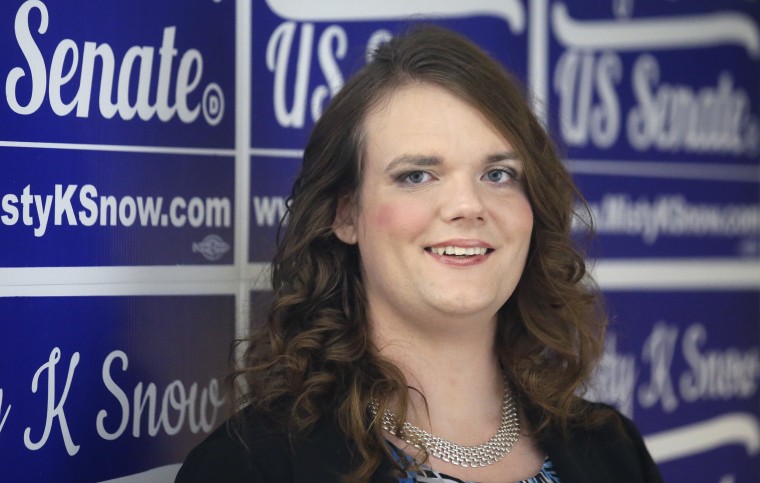
Snow has never met Senator Lee, but she is slated to debate him at the school, which is Lee’s alma mater, on October 12.
Liz, who is 31 and considers herself a nontraditional student and cites pollution as a big issue for her, was getting a smoothie, realized the fair was happening and rushed in to meet Snow.
“I saw Misty’s sign, and I was really really excited,” she tells me. “She’s sort of a celebrity. It’s a big deal. Coming here she’s very, very brave. In my women’s studies class, we talk about her. I was worried that maybe they weren’t being nice to Misty.”
"These are my people," Snow tells me before another student arrives to inspect her table, which is largely bereft of what the other candidates seem to have. There are no big banners emblazoned with her face on them. She didn’t bring t-shirts to hand out, but she has bumper stickers. Other candidates have candy; she has buttons. Gary Johnson and Bill Weld’s table seems to have some kind of board game. A lot of men are hanging out at his table.
"The air quality is killing us," I overhear Snow tell a student.
Snow seems to get the stragglers from other tables. Mostly women talk to her, but some men are receptive, including one pushing a baby in a stroller. She engages a Trump supporter named Bryan, who is registered to vote in Virginia. Bryan, a registered Republican, says he engaged Snow in a conversation on home schooling, and that he also cares about issues such as terrorism, the economy and education among others.
Later Snow tells me that her customers, many of which are Republican and have known her since she was a teen, often compare her to Trump. “They’ll say I’m an outsider just like him. I’m not going to tell the Trump Republicans they can’t vote for me, right? I could certainly use their votes. And there are some Trump Republicans that just hate Mike Lee because of what Mike Lee did at the RNC.”
Snow frequently mentions her working class roots during the event; I do not once hear her mention being transgender. And as the event begins winding down, she stays until the very end. She is literally the last person to leave the room. And it doesn’t feel calculated.
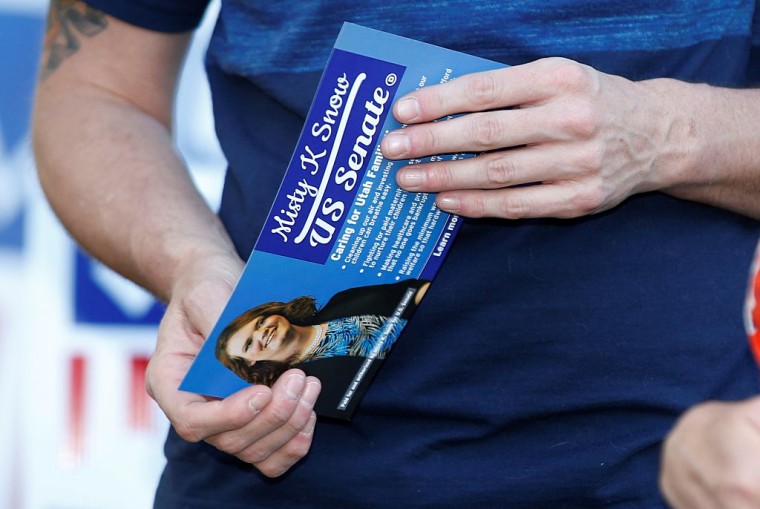
Snow’s campaign office is one room on the top floor of the Mike Weinholtz campaign complex in south Salt Lake City, just off a busy four-lane road near the Central Pointe TRAX station and the shell of what was once Club Expose. The campaign building once housed a non-denominational church. It’s here where I meet Snow for our sit-down interview, in the campaign office where a woman named Rikki sits at a computer near a fan. The room has large windows that overlook the road, old carpeting, a rickety conference table and a big bowl of candy -- Lemonheads and other items in brightly-wrapped plastic.
"The demographics are changing,” Snow tells me. “Utah's a very young state. Millennials are much more liberal, even Mormon millennials. I think that's going to change the politics of the state. Also, there's more diversity. It's becoming less LDS; it's becoming less white, so there's a lot of different factors there."
After our interview, volunteer Chris Lejeune drives Snow to a "meet the candidate" event at the Jitterbug Coffee Hop, a cozy little spot off a busy road in Salt Lake City. About 15-20 people have shown up for the event, sponsored by the 1 to 5 Club, a “support and social group” run by the Utah Pride Center. People other than Snow are drinking coffee and eating plates of nachos. There are some amplifiers and a guitar stacked next to chairs in the right corner of the room. The crowd is a mix of younger hip kids and a senior citizen or two.
RELATED: Will 2016 Be a 'Watershed' for LGBTQ Women in Politics?
During the event, people are encouraged to ask questions about Snow’s platforms. The questions range from health care and bisexual concerns to clean air. Snow, sitting on a stool at the bar, looks relaxed and eagerly answers any questions that come her way. Her responses are still a blur, she fires off answers in rapid-fire bursts, and, while she's speaking passionately, I’m not entirely sure people are understanding what she’s saying. I see a woman looking at her plate of food as Snow is speaking, while another person is taking notes.
When the cameras are all packed up and the recording devices are off, Snow slows down a bit and seems more at ease. In the limited time I spend with her, it’s a rare moment when she just seems to be relaxing. She’s milling about, talking with her campaign staffers and people who have hung around to answer questions away from a larger group. As I’m packing up my gear, I ask her if she’s headed home to get some sleep before tomorrow. She looks at me and gives me a smile and then says "Sleep? What is that? Everyone keeps telling me about it."
I also ask Snow if she ever wants to take a Sunday off at the grocery store, since she’s campaigning steadily every other day of the week. Snow basically indicates working there is her form of relaxing. She says if she’s at home, she’s looking at her emails or dealing with campaign stuff, but being at work is her time to turn all that off and focus on the task at hand. She can’t look at her phone while she’s on the clock, and that to her is relaxing.
When I leave her, Snow is still standing outside the Jitterbug, talking with stragglers and her campaign people. Even if she’s down in every poll, she’s not acting like it. As she told me outside BYU, she’s always the first person to show up and the last person to leave, because that is what you have to do when you’re serious about the issues and your campaign.
As introverted as Snow seems to be, and maybe as much as she might prefer to just be working at the grocery store and being at home, she does seem like a natural fit for civic life. She’s deeply well-versed in the issues she cares about: clean air, health care and marijuana decriminalization at the federal level. This really does seem like the arena for her -- maybe not as a member of Congress but somehow helping to shape policy and affect change in some way.
Perhaps most noticeably -- and despite the breakneck pace of the campaign trail -- she never seems to lose sight of what brought her to this arena in the first place.
“Why not actually stand up for the working class and the LGBT community and women and minorities? Let’s talk about the issues we care about, try and raise awareness and move the dialogue and make progress on issues we care about instead of trying to run away from them. Let’s actually excite people.”
Drew Katchen is an NBC OUT contributor and a writer and producer for MSNBC.com.